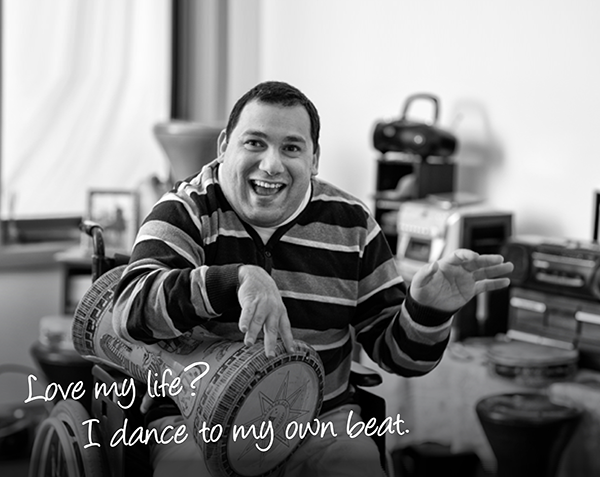Disability Attendant Support Service (DASSI)
Standfirst
Disability Attendant Support Service (DASSI) is a not-for-profit organisation that helps people with disabilities maximise their personal independence, and build fulfilling lives within their communities. DASSI employees and carers use regularly updated file-management and communications tools donated by Microsoft through its relationship with Connecting Up. These provide service insights and continually enhance communication. As a result, 800 DASSI carers provide highly responsive home-care, and react quickly to emergency and out-of-hours calls. This ensures up to 1,000 clients—who range from having a mild disability to complex requirements—are freed from long-term dependence on hospitals or care facilities, and have the resources they need to build active, independent lives at home.
The Challenge
Creating Efficient Home Care SupportDisability Attendant Support Service (DASSI) is one of many Australian not-for-profits that provide dedicated social services on behalf of government, and other social services organisations. Through a mix of private donations and state contracts, DASSI organises a network of 800 carers across Victoria to provide dayto-day and specialist home-living support for people with severe disabilities, and the elderly. “Our core mission is to help our clients—who are people with disabilities—to maximise their personal independence, and build fulfilling lives within their communities,” says Peter Batsakis, Chief Finance Manager, DASSI. “To do this our carers undertake over 4,000 shifts each week, performing many of the tasks our clients require to stay living in their own homes: from help showering and dressing, to cooking, cleaning, laundry and local transportation.”
DASSI carers also provide the specialist medical support that people on ventilators or artificial feeds need to live outside hospitals. They create tailored care programs for people with serious injuries, to facilitate rapid discharge from hospitals, and they make home-living choices more sustainable by providing emergency and after-hours care. Like every charitable organisation, DASSI confronts an acute dilemma when deciding how to prioritise the technologies and capabilities they want. “We have limited funds for IT, and we are obliged to reduce these costs as far as practicable,” says Batsakis. “We are accountable for every penny we spend, so we have to minimise our overheads.” To improve the speed and thoroughness of their service, however, DAASI carers and administrators are eager for each new generation of collaboration tools, so they can quickly find and exchange client details, and respond quickly to emergencies. Head office staff also want the ability to closely track spending on every service—both to identify efficiencies, and to enhance donor accountability.
The Solution
Faster Ways of Working for Carers and Head Office StaffSince 2008, DASSI has partnered with another not-for-profit, Adelaide-based Connecting Up, to help all staff members work more effectively. Connecting Up acts as an intermediary, connecting charitable organisations with the corporate donation programs run by major technology businesses. “Through Connecting Up, Microsoft in Australia has helped 14,000 notfor-profit organisations to stay technologically up to date, with A$245 million-worth of product donations,” says Josh Goodwin, Executive Manager for Business and Partners, Connecting Up. “In Financial Year 2013 alone, Microsoft donated over $40 million worth of technology to not-for-profits through Connecting Up, and our research shows the social return on that investment exceeded $80 million.”
Microsoft donations have enabled DASSI to use successive versions of Microsoft database technologies to support and enhance its in-house client file-keeping system. It also uses finance-management software to manage accounting and invoicing. To help head office staff work quickly and efficiently with documents, files and emails, DASSI has also deployed successive versions of Microsoft Office, as well as email servers and desktop operating systems. “Microsoft gifted us the software after we established eligibility for their corporate donation program,” says Jamie Murgatroyd, IT & Account Manager for Blue Apache, which maintains DASSI IT. “Once the costs of getting it installed are taken into account, this means DASSI uses cutting edge software for only 10–20% of the commercial cost.” Since 2013, DASSI has also introduced new tools that dramatically increase worker flexibility. DASSI employees now use remote desktop technologies, so they can work with what appears to be their office desktop from most connected PCs or laptops. Microsoft ActiveSync software means email on colleagues’ mobile devices is always up to date. “These programs allow us to create an efficient working environment that we otherwise could not afford,” says Batsakis. “The effect is that we have the resources to stay focused on meeting the needs of the people who matter the most—our clients. Without this technology, we wouldn’t be able to do the work we are doing.

The Benefits
Transparency for FundersWith sustained support from Microsoft through Connecting Up, DASSI can operate transparently on behalf of its funders, and provide exceptional service to the agencies that procure its services. “We can accurately track all the services we provide, right across Victoria,” says Batsakis. “If an agency says that they have $50,000 to spend with us, we can track and manage how that money is spent, right down to the last dollar. This makes our organisation very easy to work with.” “Good business intelligence also makes us efficient,” he adds. “We can easily generate the statistics we need to analyse how we are organising and delivering care. Ultimately, increased efficiency means that the money we are given goes straight to providing top-quality care.”
Better On-the-spot Care for Disabled Home-residentsThe principal beneficiaries are the people with disabilities that DASSI supports. With Microsoft Exchange email on their smartphones, constantly synchronised using ActiveSync, DASSI care managers can respond much more quickly to requests, or a change of circumstance. If a client needs assistance or advice out of hours, the carer can be contacted instantly, and provided with all necessary information via their smartphones. “Today, our clients are receiving an ever-more responsive service from our 800 carers,” says Batsakis. “Having a top-grade database, means client files are always up to date—and knowing each individual’s needs makes a huge difference to the value of the help we give. They get the type of assistance they need, when they need it.”
Security and Independence, 24/7With more responsive care, people with disabilities have greater confidence in their home-living arrangements. According to Batsakis, an enhanced sense of personal safety and well-being directly influences the difficult domestic choices our clients have to make. “Better care isn’t just efficient care: it’s providing that extra level of support then enables people who are severely ill or disabled to live confidently in their own home—and not become dependent on hospitals or specialist care facilities,” says Batsakis. “This also reduces the burden on the public health system.” “A top-class client file system, plus up-to-date collaboration tools mean we can all react faster and take the initiative. And the more proactive we are, the more our clients can stay at home. Home is where everyone is happiest, and it’s where people with disabilities can lead the nearest thing possible to an independent life: a life where they are in control.”
The Disability Assistant Support Service (DASSI) is a Victoria-based not-for-profit organisation that provides the home-care services that people with disabilities need to stay living in their home homes. DASSI employs 31 staff members at its head office in Northcote, and engages approximately 800 carers to perform shiftwork across the state.

